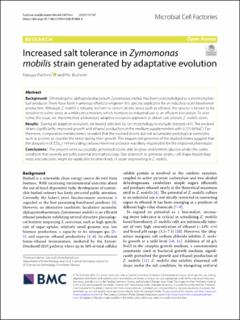| dc.contributor.author | Fuchino, Katsuya | |
| dc.contributor.author | Bruheim, Per | |
| dc.date.accessioned | 2020-11-13T12:40:49Z | |
| dc.date.available | 2020-11-13T12:40:49Z | |
| dc.date.created | 2020-08-06T08:49:18Z | |
| dc.date.issued | 2020 | |
| dc.identifier.citation | Microbial Cell Factories. 2020, 19 (1), . | en_US |
| dc.identifier.issn | 1475-2859 | |
| dc.identifier.uri | https://hdl.handle.net/11250/2687816 | |
| dc.description.abstract | Background
Ethanologenic alphaproteobacterium Zymomonas mobilis has been acknowledged as a promising biofuel producer. There have been numerous efforts to engineer this species applicable for an industrial-scale bioethanol production. Although Z. mobilis is robustly resilient to certain abiotic stress such as ethanol, the species is known to be sensitive to saline stress at a mild concentration, which hampers its industrial use as an efficient biocatalyst. To overcome this issue, we implemented a laboratory adaptive evolution approach to obtain salt tolerant Z. mobilis strain.
Results
During an adaptive evolution, we biased selection by cell morphology to exclude stressed cells. The evolved strains significantly improved growth and ethanol production in the medium supplemented with 0.225 M NaCl. Furthermore, comparative metabolomics revealed that the evolved strains did not accumulate prototypical osmolytes, such as proline, to counter the stress during their growth. The sequenced genomes of the studied strains suggest that the disruption of ZZ6_1149 encoding carboxyl-terminal protease was likely responsible for the improved phenotype.
Conclusions
The present work successfully generated strains able to grow and ferment glucose under the saline condition that severely perturbs parental strain physiology. Our approach to generate strains, cell shape-based diagnosis and selection, might be applicable to other kinds of strain engineering in Z. mobilis. | en_US |
| dc.language.iso | eng | en_US |
| dc.publisher | BioMed Central | en_US |
| dc.rights | Navngivelse 4.0 Internasjonal | * |
| dc.rights.uri | http://creativecommons.org/licenses/by/4.0/deed.no | * |
| dc.title | Increased salt tolerance in Zymomonas mobilis strain generated by adaptative evolution | en_US |
| dc.type | Peer reviewed | en_US |
| dc.type | Journal article | en_US |
| dc.description.version | publishedVersion | en_US |
| dc.source.pagenumber | 11 | en_US |
| dc.source.volume | 19 | en_US |
| dc.source.journal | Microbial Cell Factories | en_US |
| dc.source.issue | 1 | en_US |
| dc.identifier.doi | 10.1186/s12934-020-01406-0 | |
| dc.identifier.cristin | 1821947 | |
| dc.description.localcode | Open Access This article is licensed under a Creative Commons Attribution 4.0 International License, which permits use, sharing, adaptation, distribution and reproduction in any medium or format, as long as you give appropriate credit to the original author(s) and the source, provide a link to the Creative Commons licence, and indicate if changes were made. The images or other third party material in this article are included in the article's Creative Commons licence, unless indicated otherwise in a credit line to the material. If material is not included in the article's Creative Commons licence and your intended use is not permitted by statutory regulation or exceeds the permitted use, you will need to obtain permission directly from the copyright holder. To view a copy of this licence, visit http://creativecommons.org/licenses/by/4.0/. The Creative Commons Public Domain Dedication waiver (http://creativecommons.org/publicdomain/zero/1.0/) applies to the data made available in this article, unless otherwise stated in a credit line to the data. | en_US |
| dc.source.articlenumber | 147 | en_US |
| cristin.ispublished | true | |
| cristin.fulltext | original | |
| cristin.qualitycode | 1 | |

